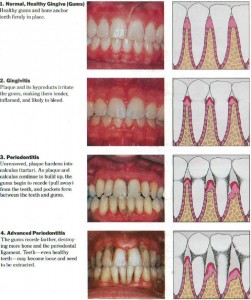Many people in the United States have some form of gum disease. Some cases are mild while others are more severe.
Gingivitis is a mild form of periodontal disease which is reversible. In gingivitis, the gums become red, swollen, and bleed very easily. It is seen a lot more in teenagers and young adults. Gingivitis can be easily prevented by brushing two to three times daily for a total of two minutes each time, along with flossing once daily. The good news about gingivitis is that it can be reversed if you already have it.
Periodontitis, on the other hand, is the more severe form of periodontal disease that cannot be reversed. In periodontitis, gums pull away from the teeth and form “pockets” that eventually become infected. The plaque, tarter, and bacteria gets below the gum line which starts to form spaces or “pockets.” Proper oral hygiene can prevent periodontitis. Not only does periodontal disease affect your teeth and gums, it also affects your overall health. Some examples that periodontal disease can cause are: heart disease, stroke, pancreatic cancer, osteoporosis, respiratory disease, etc.
Find below a brief pictorial representation for the various stages of periodontal disease.
Usually from the minute the “cleaning” begins, you can usually tell if someone has or might be prone to periodontal disease. In some cases, patients have never been “probed” before. The probe is the instrument we use to determine the amount of bone loss a patient has. The probe has millimeter markings that go from 1 to 10 mm. Some probes can go up to 12 mm. One to three millimeters is considered healthy gums. Four millimeters and above is considered periodontal disease. Unfortunately, a lot of people are unaware of their gum health until they come in our office.
There are different ways to treat periodontal disease. Depending on how advanced the periodontal disease is, you may be referred to a gum specialist called a periodontist. First, the hygienist will do a “deep cleaning” also known as “scaling and root planing.” This, combined with proper oral hygiene, will help improve the “pockets” formed from periodontal disease. There are different ways to help keep the periodontal disease under control. You may be prescribed an antimicrobial mouth wash containing chlorhexidine that helps fight gingivitis and periodontal disease. Such mouth rinses are safe and effective. The rinse also helps heal swollen and irritated gums.
Ask our team if you have any questions about your gum health.






